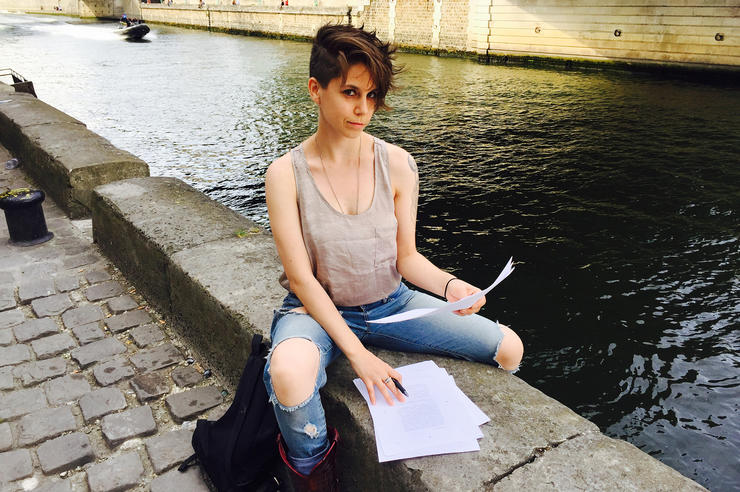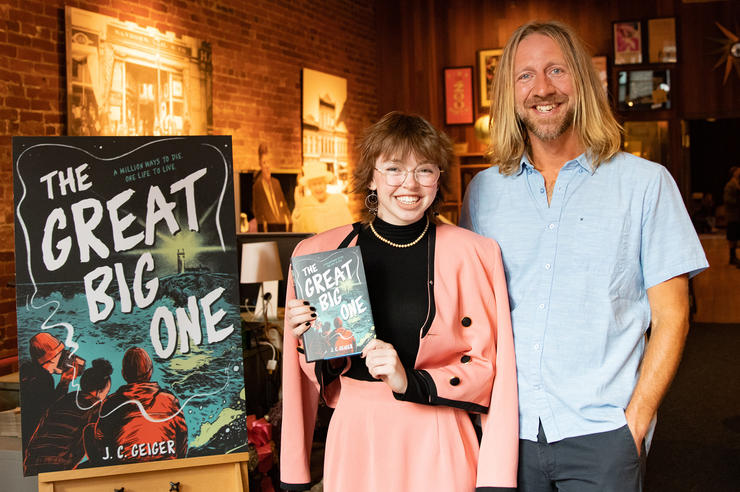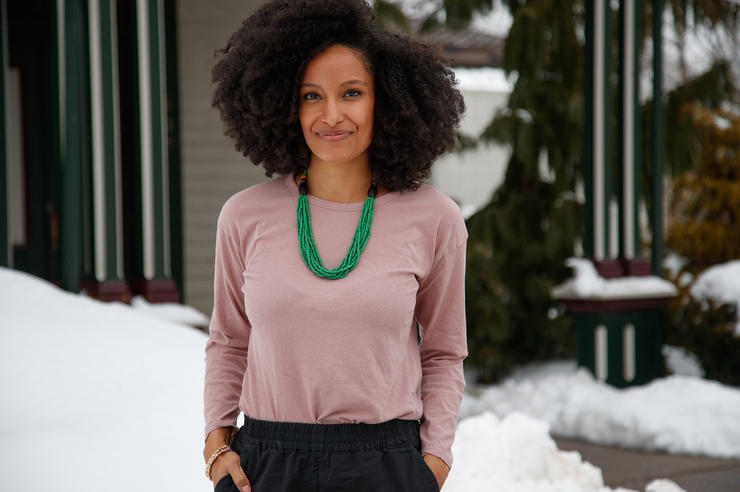A ‘Whale’ of a tale
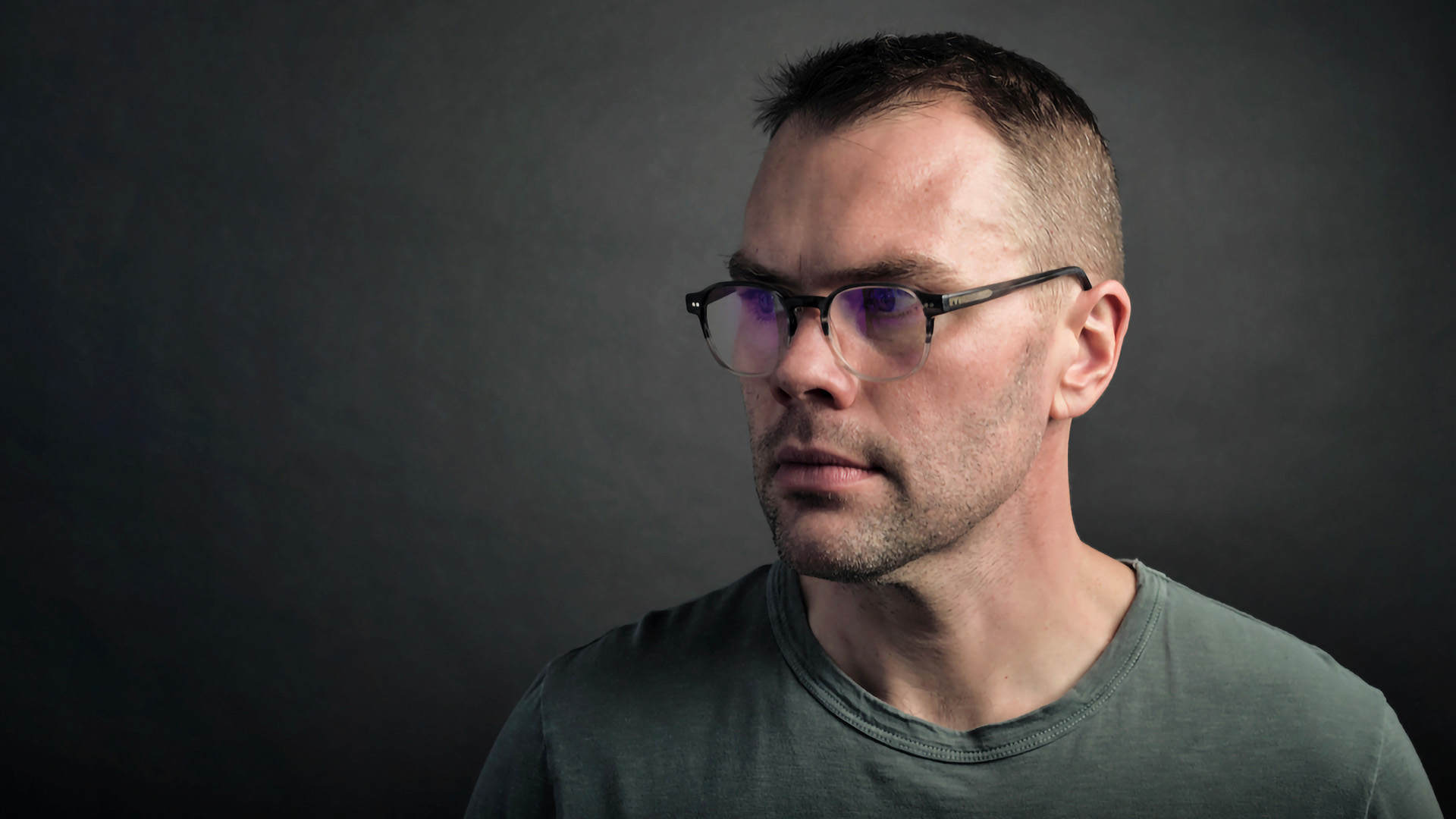
For his creative work, playwright Samuel D. Hunter has earned a Drama Desk Award, an Obie Award, and a MacArthur “genius grant” fellowship, among other honors. But the University of Iowa graduate says one of his biggest feats was developing his 2012 play The Whale into a 2022 film of the same name.
Hunter wrote the screenplay for the film, an A24 production starring Brendan Fraser and Sadie Sink and directed by Darren Aronofsky. The story centers on an online writing instructor named Charlie, whose severe obesity has confined him to his second-floor apartment in Idaho and is causing his health to rapidly deteriorate, and his attempt to reconnect with his estranged teenage daughter.
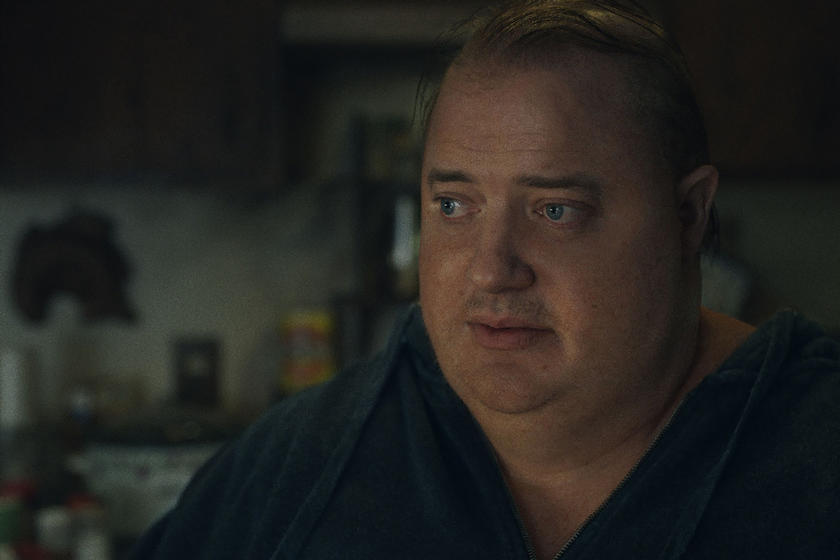
The Whale, featuring a screenplay by University of Iowa alumnus Samuel D. Hunter that was adapted from his original work for the stage, received three Academy Award nominations, including a nod to Brendan Fraser (above) for Best Actor.
Although Hunter, a 2007 graduate of the Iowa Playwrights Workshop, had worked in television before—he wrote for the FX series Baskets—this was his first time writing a film. It was an experience he suspects he will not top.
“It is a very rare, if not impossibly rare, experience for a screenwriter to have a world-class director preserve his script so faithfully and also be invited to be on set the entire time,” says Hunter, whose plays include A Case for the Existence of God and A Bright New Boise. “It was like a master class in filmmaking.”
Aronofsky, who received an Academy Award nomination for directing Black Swan, saw the play in New York City and called Hunter about securing the film rights. A decade later, the movie premiered at the Venice International Film Festival, where it received a six-minute standing ovation. The film has garnered multiple award nominations, including Oscar and Golden Globe nods for Fraser, and several festival honors.
“We got so much face time with our instructors at Iowa. They’d be willing to get a meal or a drink with you, so here we were going out for pizza with Pulitzer Prize–winning playwrights. It was incredible. It’s not an experience you likely would get in a master’s program in the city.”
The Iowa Playwrights Workshop, the university’s MFA program in playwriting, is an intensive three-year program dedicated to educating playwrights for the professional theater. Graduates have found success in every medium of dramatic writing, including stage, screen, television, and nontraditional performance.
Though fictional, the story draws on several real-life experiences for Hunter, who grew up in Moscow, Idaho, and was kicked out of his religious high school when he came out as gay. A public school teacher later encouraged Hunter to pursue his interest in writing, and at first he immersed himself in poetry. Then, he read Our Town and Angels in America.
“Reading those two plays really lit something in me. I wrote my first play when I was 16 and petitioned our community theater to give me $300 to produce it, with some very gracious local actors,” he says. “It was way too complex and almost three hours long. Then I learned that New York University had a dramatic writing program with a 25-page limit for application submissions, so I wrote a two-character, one-act play. Those constraints made me such a better writer immediately.”
Hunter wanted to continue developing creative work in graduate school. Although he hadn’t spent time in the Midwest, when the Iowa Playwrights Workshop offered him a fellowship, he accepted. The location was ideal.
“We got so much face time with our instructors at Iowa,” he says. “They’d be willing to get a meal or a drink with you, so here we were going out for pizza with Pulitzer Prize–winning playwrights. It was incredible. It’s not an experience you likely would get in a master’s program in the city.”
Award-winning playwright Samuel D. Hunter met his dramaturge husband, John Baker, while both were grad students at the University of Iowa. The couple hopes to introduce their 5-year-old daughter to Iowa City in 2023. Here are some of the places Hunter says they enjoy most:
- Squire Point Trail along Coralville Lake: “We named our 35-pound terrier–border collie mix Squire because in our early days we used to hike at Squire Point.”
- The Amana Colonies: “We love the family-style dinners.”
- John’s Grocery: “I developed my deep love of beer there. I want to go back and raid the beer selection.”
- Stringtown Grocery in Kalona
Additionally, Hunter says, Iowa’s level of production support, including “an army of undergrads who were very willing to do your play in a moment’s notice,” is invaluable for budding playwrights. He saw three of his plays produced on campus, including I Am Montana, which later ran at London’s Arcola Theatre in 2009 and ultimately got him into the playwrights program at Juilliard.
It was after his graduation from Juilliard that Hunter began writing what became The Whale. He was living in New York City and had taken a job teaching an expository writing class at Rutgers, a course all first-year students were required to take.
Hunter sensed that many of his students didn’t have faith in the course and simply wanted to get a passing grade. One day, he asked them to write something honest and promised they would work together to craft an essay. One of the responses made it into the play—and the film.
“My students wrote incredible things. One wrote, ‘I think I need to accept that my life isn’t going to be very exciting,’ and it was such a heartbreaking and beautiful and vulnerable thing for this kid to write,” he says. “That was when I asked myself if I could write a play about an expository writing teacher. It seemed very intellectual and weird, but I thought maybe I could do it.”
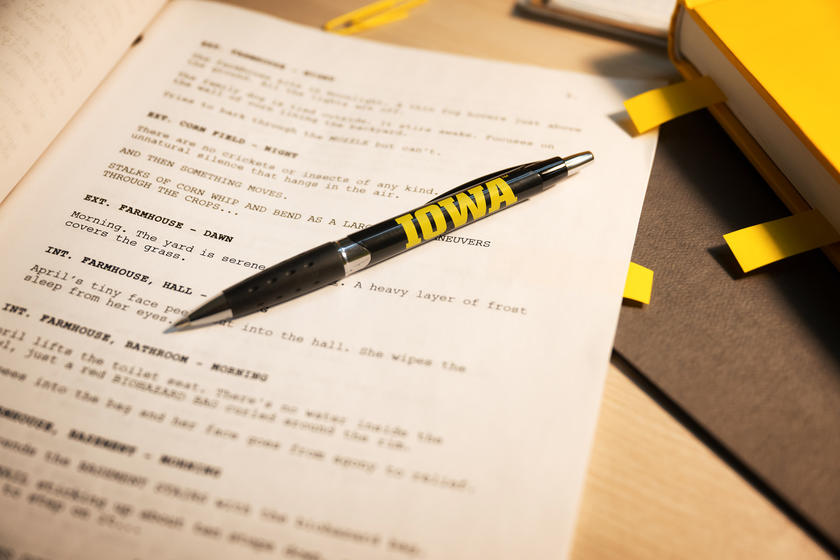
The University of Iowa’s new major in screenwriting arts builds on the institution’s long and renowned tradition in creative writing—and enrollment is growing fast.
Hunter wrote about 25 pages, but to him it didn’t “jell,” so he took his own advice and made it more personal.
“Up until that point, I had kept myself at somewhat of a distance from my own writing,” he says. “The Whale is set in my hometown. I attended a religious school, one I had to leave when they found out I was gay. That resulted in years of depression and self-medication with food. When I started bringing in sections of the play to various writer groups I was in, I was very trepidatious about it—I think on some level I knew how vulnerable it was—but it felt like there was a resonance with it that I hadn’t had with my previous plays.”
The Whale, which premiered at Playwrights Horizons in New York, went on to win a Drama Desk Special Award, a Lucille Lortel Award for Outstanding Play, and a GLAAD Media Award. Hunter, currently serving as resident playwright at New York’s Signature Theatre, shares what it was like to adapt The Whale for film and work with the film’s director, Darren Aronofsky.
Describe your experience adapting The Whale.
It was a very slow process—10 years in the making. I would generate a draft and send it to Darren’s company. He would have some thoughts. His executives would have some thoughts. Then a year might go by and he would have an opening in his schedule, so we’d reengage and continue developing it. I wanted to be a good collaborator, but at the same time, this story and this character were so dear and so close to me that it was really hard for me to see a different way to do it. I expected Darren to want to add locations and characters, but in one of our early meetings, I was so glad to hear him say, “Let’s keep it in the apartment.”
Did the film feel true to your play?
Although I was very involved in the production process, being on set for two and a half months, I wasn’t involved in the edit. So, when Darren invited me to watch a rough cut, my heart was beating out of my chest and my palms were sweaty. About five minutes into the screening, I was like, “He did it. He did exactly what I was hoping it would be.” It’s heartfelt and keenly observed. It’s the story I wanted to tell.
What do you want viewers/readers to take away from this story?
Early in my career I made the decision that I wasn’t going to be a cynical writer. To me, cynicism is easy and intellectually bankrupt. The harder thing is to have faith in someone and to have hope, especially right now. My hope is that people get the sense that this story is about hard-won hope and dignity and about the importance of having faith in other people, which is something Charlie has in spades. The world has given him every reason to be cynical, every reason to not have faith in other people, but he refuses to lose that faith. That’s the heart of the film.
The film screened at multiple film festivals before opening in theaters. What was that like for you?
I was surprised by how similar it was to the opening of a play. There’s opening night, the reviews, the anxiety, the audience, and the Q&As, but one of the nice things about a film is having the production set in stone. The anxiety of what’s going to happen from night to night is not there. Even though I don’t go to every performance of my plays, I still anxiously await the performance reports. With the film, I know exactly what people are getting, which is nice.
